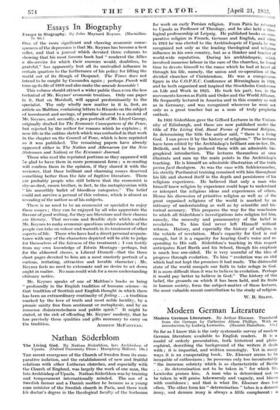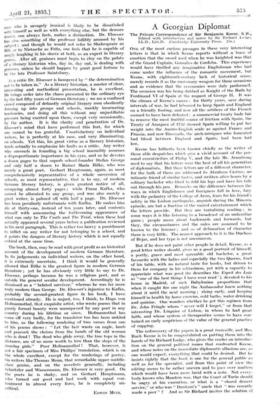Modern German Literature
Modern German Literature. By Arthur Eloesser. Translated from the German by Catherine Alison Phillips. With an introduction by LUdwig Lewisohn. (I:famish Hamilton. 15s.) So far as I know this is the only systematic survey of modern German literature, available to English readers. It is a model of orderly presentation, both historical and philo- sophical, describing the background of the writers it deals with ; it is impartial, and written amusingly. Yet in many ways it is an exasperating hook. Dr. Eloesse.r seems to be incapable of enthusiasm ; he possesses only too incontestably " the immense sobriety which is so characteristic of Berlin . . . its determination not to be taken in " for which Mr. Lewisohn praises him. A man who- is determined not to be taken in will praise lukewarmly and vaguely, and blame with confidence ; and that is what Dr. Eloesser does too often. The other form his " determination " takes is a demure irony, and demure irony is always a little complacent : a man who is savagely ironical is likely to be dissatisfied with himself as well as with everything else, but the demure ironist, one always feels, makes a distinction, Dr. Eloesser has also something of the professor fallibly amused by his subject ; and though he would not refer to Shakespeare as Bill, or to' Nietzsche as Fritz, one feels that he is capable of snugly laughing in his sleeve at both, as an expert in literary genius. After all, geniuses must begin to cloy on the palate of a literary historian who, day in, day out, is dealing with geniuses, tinlesi he should happen by great good fortune to be the late Professor Saintsbury.
As a critic Dr. Eloesser is hampered by " the determination not to be taken in." As a literary historian, a master of clear, interesting and methodical presentation, he is excellent. He brings order into the chaos presented to the ordinary eye by the last fifty years of German literature ; we see a confused crowd composedof defiantly original literary men obediently forming up into groups and schools, meekly incarnating tendencies, and doing all this without any unjustifiable pressure being exerted upon them, except very occasionally, by the author. It is the clarity and penetration of Dr. Eloes.ser's mind that have performed this feat, for which one cannot be too grateful. Unsatisfactory on individual writers, he is perfectly at his ease, and very illuminating, on schools. "Vet this, his great virtue as a literary historian, tends actually to emphasize his faults as a critic. Any writer who succeeds in founding a big school insensibly assumes a disproportionate importance in his eyes, and so he devotes a dozen pages to that superb school-founder Stefan George and only half a dozen to Rainer Maria Rilke, who was merely a great poet. Gerhart Hauptmann, again, as most comprehensively representative of a whole succession of schools, as most representative, that is to say, of modern German literary history, is given greatest notice of all, occupying almost forty pages ; while Franz Kafka, who cannot be allocated to any group, and was also merely a great writer, is palmed off with half a page. Dr. Eloesser has been peculiarly unfortunate with Kafka. He makes him die at thirty-one, instead of ten years later, and contents himself with announcing the forthcoming appearance of what can only be The Castle and The Trial, when these had actually appeared several years before a publication reviewed in his next paragraph. This is rather too heavy a punishment to inflict on any writer for not belonging to a school, and it points the dangers of literary history which is not equally critical at the same time.
The book, then, may be read with great profit as an historical account of the development of modern German literature. In its judgements on individual writers, on the other hand, it is extremely uncertain. I think it would be generally allowed that Rilke is the greatest figure in modern German literature ; yet he has obviously very little to say to Dr. Eloesser, perhaps because he was a religious poet, and so Outside the general secular development. Accordingly he is dismissed as a " belated survivor," whereas he was far more truly madern'than George: Dr; Eloesser's injustice to Kafka, probably the- second-greatest figure in his book, I have mentioned already. He is unjust, too, I think, to Hugo von Hofmannsthal!, that exquisite artist, who wrote poems that in purely formal beauty were unsurpassed by any poet in any country during his lifetime or since. Hofmannsthal has come off very badly, for the translator too has been unkind to him; as the following rendering Of two verses from one of his poems shows : " Let the heir waste on eagle, lamb and peacock the chrism from the hands of the old woman who is dead ! ' The dead who glide away, the tree tops in the distance, are of no more worth to him than the steps of the (lancing Poor Hofmannsthal ! That, however, is not a fair specimen of Miss Phillips' translation, 'which is on the whole excellent, except for the renderings of poetry. On writers like Thomas Mann, that remarkable upper middle- class genius, and on the novelists generally, including Schnitzler and WaSsermann, Dr. Eloesser is very good. On the poets he is shaky, and on Gerhart Hauptmann, who turned out good and 'bad work with' equal con- tentment in .althost every fonn, he is completely 'un- critical.
EDWIN MUM.







































 Previous page
Previous page